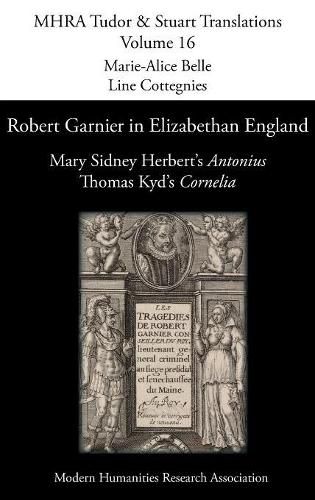Readings Newsletter
Become a Readings Member to make your shopping experience even easier.
Sign in or sign up for free!
You’re not far away from qualifying for FREE standard shipping within Australia
You’ve qualified for FREE standard shipping within Australia
The cart is loading…






This title is printed to order. This book may have been self-published. If so, we cannot guarantee the quality of the content. In the main most books will have gone through the editing process however some may not. We therefore suggest that you be aware of this before ordering this book. If in doubt check either the author or publisher’s details as we are unable to accept any returns unless they are faulty. Please contact us if you have any questions.
This volume gathers together, for the first time, Mary Sidney Herbert’s Antonius (1592) and Thomas Kyd’s Cornelia (1594), two significant and inter-related responses to Robert Garnier’s Roman plays, Marc Antoine (1578) and Cornelie (1572). As a unique diptych the translated plays offer invaluable insight into the often ghostly presence of French literature in Elizabethan culture. They also mark an important chapter in the development of early modern neoclassical drama, with Sidney Herbert and Kyd creatively engaging, each in their own way, with Garnier’s learned, Senecan tragedies.
This edition offers a critical introduction situating the plays in the rapidly shifting context of the 1590s and discussing their critical reception as translations. The footnotes aim to illuminate Sidney Herbert’s and Kyd’s distinctive translation practices by signaling significant amendments to Garnier’s text and by tracing the web of intertextual allusions that connects each translation, not only with Elizabethan practices of patronage, readership, and text circulation, but also with the wider intellectual and political debates of the late European Renaissance. Also featuring textual notes, a list of neologisms, and a glossary, this edition documents each text’s material and editorial history, as well as their joint contribution to the linguistic creativity of the Elizabethan age.
$9.00 standard shipping within Australia
FREE standard shipping within Australia for orders over $100.00
Express & International shipping calculated at checkout
This title is printed to order. This book may have been self-published. If so, we cannot guarantee the quality of the content. In the main most books will have gone through the editing process however some may not. We therefore suggest that you be aware of this before ordering this book. If in doubt check either the author or publisher’s details as we are unable to accept any returns unless they are faulty. Please contact us if you have any questions.
This volume gathers together, for the first time, Mary Sidney Herbert’s Antonius (1592) and Thomas Kyd’s Cornelia (1594), two significant and inter-related responses to Robert Garnier’s Roman plays, Marc Antoine (1578) and Cornelie (1572). As a unique diptych the translated plays offer invaluable insight into the often ghostly presence of French literature in Elizabethan culture. They also mark an important chapter in the development of early modern neoclassical drama, with Sidney Herbert and Kyd creatively engaging, each in their own way, with Garnier’s learned, Senecan tragedies.
This edition offers a critical introduction situating the plays in the rapidly shifting context of the 1590s and discussing their critical reception as translations. The footnotes aim to illuminate Sidney Herbert’s and Kyd’s distinctive translation practices by signaling significant amendments to Garnier’s text and by tracing the web of intertextual allusions that connects each translation, not only with Elizabethan practices of patronage, readership, and text circulation, but also with the wider intellectual and political debates of the late European Renaissance. Also featuring textual notes, a list of neologisms, and a glossary, this edition documents each text’s material and editorial history, as well as their joint contribution to the linguistic creativity of the Elizabethan age.